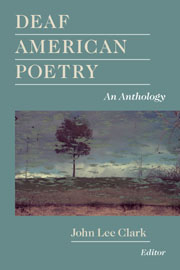|
An Anthology
John Lee Clark, Editor View the table of contents. $35.00s print edition |
Shopping Cart Operations
Add to Cart |
From Prick of the Spindle, cont’d.
A discussion on political implications is necessarily included as a discourse that surfaces, in some form, in every poet’s biography. The prejudice and oppression of oralism, which discourages the use of signing to encourage speech and lip reading, along with audism, which most often refers to the assumption of superiority by the hearing, detract from the lives of the Deaf and from their culture. Poets run the gamut from angry and embittered to activist-oriented to satisfied and at peace—in other words, just as with the world of the hearing. However, unlike the hearing, many of whom have suffered wounds with tangible scars, the scars of the Deaf are troublingly less visible; Christopher John Heuer writes in his powerful poem, “Visible Scars,” that, unlike a victim of slavery whose received lashes are evidenced by scars and broken skin, he has no visible proof:
I reached for my ears but could not pull them off.
I felt in my ears but nothing was there.I wished for scars like hers.
I wished to stand up and scream Look!
Look, look, look!
I wanted proof to show her, I wanted
centuries of songs to the Lord.
Poets like Earl Sollenberger and Felix Kowalewski internalized a sense of prejudice, which was increasingly felt in the Deaf community and eventually led to the Deaf Pride movement. Clark notes in the Kowalewski biography that, “If audism acts in the same way racism does, then what W. E. B. Du Bois and James Baldwin say applies: The real danger lies not in the white man hating the black man but in the black man hating himself.” More recently, poets such as Linwood Smith (1943-1982) have made significant contributions to Black Deaf culture, which is continued by contemporary poets such as Abiola Haroun and Kristi Merriweather.
Some of the most powerful, evocative poetry is being written by contemporary poets. Raymond Luczak’s “Learning to Speak, Part I” evokes Allen Ginsberg with his line that refers to signing as “hands howling volumes.” In turn, Pamela Wright-Meinhardt writes in the indignant and inspired “Silent Howl,”
I have seen strong-willed individuals crumble in desperation,
flailing in frustration, crying out in a fight against
helplessness, and straining against steely chains,
clinging to stubbornly optimistic desires against
constant oppression and ignorance, and
I have seen denials repeatedly Uncle Tom-ed, the wishfully
daring becoming fodder for pinching, parroting crabs
retrogressingly destroying courage with silence, but
I have seen a degree of intensity unparalleled and lovely, and
explosion of unity and tenacious respect; quick
perseverance and worldwide pride; an ironclad
embrace on a way of life; a passionate loyalty,
unmatched, unequalled, unwavering, and loved.
The later poets in the anthology are especially interesting to examine because they inform current Deaf culture—and the poetics it contributes to—of its future. John Lee Clark, the editor of this volume, is one of those poets. Born in 1978, Clark has been published in The Deaf-Blind American, McSweeney’s, and notably, Poetry, among others. The recipient of numerous grants and poetry awards, he is the editor of an anthology on the Deaf poet Clayton Valli and the author of the poetry collection, Suddenly Slow. A communications director, he also happens to be DeafBlind.
Clark’s remarkable volume proves a vital resource, not only for Deaf poetry, but clearly for American poetry as well. The poets whose verse he includes in the anthology are nearly all connected with Gallaudet University, the University for the Deaf and the publisher of the anthology. Clark’s selection of poets is outstanding not only for the quality of its selections, but for the historical and cultural lineage it circumscribes within its biographies. From formalists to free-verse writers to ASL poets and performers, each selection is evidence, as Clark writes in the Introduction, that “sound is mere medium, not source.”
John Lee Clark is a poet and writer in Burnsville, MN.
Print Edition: ISBN 978-1-56368-413-5, 6 x 9 paperback, 312 pages
$35.00s
E-Book: ISBN 978-1-56368-455-5
$35.00
To order by mail, print our Order Form or call:
TEL 1-800-621-2736; (773) 568-1550 8 am - 5 pm CST
TTY 1-888-630-9347
FAX 1-800-621-8476; (773) 660-2235
